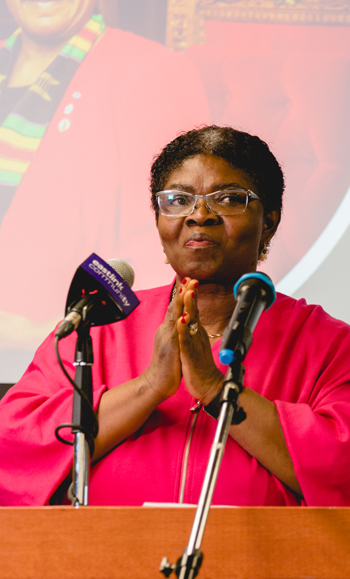As part of African Heritage Month celebrations, ┬щ╢╣┤л├╜тАЩs Black Student Advising Centre (BSAC) invited the Honourable Senator Wanda Thomas Bernard for a discussion on her experiences as a Black female leader.
Before her appointment as the first Black Nova Scotian woman in CanadaтАЩs Senate, Dr. Bernard was a social worker and professor at ┬щ╢╣┤л├╜. She was the first tenured Black Canadian professor at Dal and a founding member of the Association of Black Social Workers (ABSW).
Dr. Bernard recalled her journey to CanadaтАЩs upper house of parliament. Although she agreed with Prime Minister Justin TrudeauтАЩs campaign for Senate reform, she was skeptical about the effectiveness of the process.
тАЬI remember I said to myself, тАШIтАЩll believe that when I see it happen,тАЩ so I applied to test the system,тАЭ she said. тАЬThere were only two vacancies in Nova Scotia and 2,700 people applied.тАЭ
тАЬI almost didnтАЩt make it because of a technical requirement.тАЭ
One of the assessment criteria of a prospective Senator is individual and property net worth. Dr. BernardтАЩs retirement home was valued significantly less than the cost because it was located in East Preston, a predominantly Black community. She had to pressure the bank to provide a fair assessment in order to proceed with her application.┬а ┬а
An ongoing struggle
Dr. Bernard stated that the struggle against anti-Black racism and oppression in Canada, which contributed to the creation of the ABSW 40 years ago, still exists today.
тАЬIt troubles my spirit,тАЭ she said, тАЬthat in 2019 we are still fighting the same issuesтАЭ
Nevertheless, she encouraged everyone to тАЬturn barriers into opportunitiesтАЭ. She offered a quote from the late American poet and novelist, Maya Angelou to reinforce this attitude: тАЬWe may encounter many defeats, but we must not be defeated.тАЭ
She lauded female leaders like Rosemary Brown, Kay Livingston and Yvonne Atwell.

тАЬWeтАЩve had so many positive disruptors who are role models,тАЭ she said. тАЬWeтАЩve had so many fabulous black women in leadership that have taught us how to fight for change with our dignity and integrity intact.тАЭ
Monday's event also included a musical peformance by Sierra Leonea dancers and the Oshikoya family as well as a question-and-answer period moderated by Chike Jeffers, an associate professor in the Department of Philosophy, who posed questions about the problems with terms such as "visible minorities" and "radicalized groups."
Four female students from Dal and the University of King's College received the Nora Hickson Kelly Bursary Award at the event, presented by Dr. Bernard and BSAC advisor Ronke Taiwo (pictured right).
'Be bold'
Fighting for change is never easy, and Dr. Bernard shared her awareness of the cost of the struggle against racism.
тАЬItтАЩs so hard when you are trying to live your life and there is racism at every turn,тАЭ she said. тАЬThe reality is that racism impacts our mental, physical, and spiritual health.тАЭ
Dr. Bernard urged the audience to be bold and courageous in the face of injustice. She recounted the contributions of Viola Desmond and her sister, Wanda Robson.
тАЬWhen most people talk about Viola Desmond, they talk about the stand she took in the movie theatre, but her story started long before that,тАЭ she said.┬а ┬а
Dr. Bernard summed her experiences as a test of courage, strength, and resilience.
тАЬWhen I think about the fight for change,тАЭ she said, тАЬI believe the biggest thing is having the courage to keep getting back up when some tries to knock you down.тАЭ

